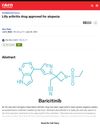 3 citations,
January 2022 in “Journal of Infection”
3 citations,
January 2022 in “Journal of Infection” Some early COVID-19 mutations in patients predicted future common virus mutations.
 2 citations,
March 2023 in “BioScience Trends”
2 citations,
March 2023 in “BioScience Trends” The review indicates that understanding of long COVID symptoms is still limited and better research is needed for diagnosis and treatment.
[object Object] June 2020 in “Faculty Opinions – Post-Publication Peer Review of the Biomedical Literature”  January 2022 in “International Journal of Nutrology”
January 2022 in “International Journal of Nutrology” Diet and nutrients, including lycopene from tomatoes and hydroquinone from wheat, can help control melasma, a skin condition.
August 2021 in “Journal of cosmetic dermatology” The editorial stresses the importance of COVID-19 vaccination and ongoing contributions to the journal.
 July 2021 in “British Journal of Dermatology”
July 2021 in “British Journal of Dermatology” The pandemic likely caused delays in skin cancer assessments, leading to fewer early diagnoses and thicker melanomas.
December 2021 in “Digital Doctor” December 2023 in “International journal of research publications” Herbal medicine and nutraceuticals may help treat Post COVID-19 Syndrome, but more research is needed.
 March 2022 in “medRxiv (Cold Spring Harbor Laboratory)”
March 2022 in “medRxiv (Cold Spring Harbor Laboratory)” People with blood group O may have a higher risk of developing post-COVID-19 syndrome.
 3 citations,
February 2022 in “Journal of Infection”
3 citations,
February 2022 in “Journal of Infection” People with no symptoms or mild COVID-19 have lower antibody levels, increasing their risk of getting COVID-19 again.
 16 citations,
September 2020 in “British journal of dermatology/British journal of dermatology, Supplement”
16 citations,
September 2020 in “British journal of dermatology/British journal of dermatology, Supplement” The article suggests that targeting specific immune pathways could help control and treat the skin disease hidradenitis suppurativa.

Taking too much Albendazole can cause hair loss and other serious side effects.
 2 citations,
May 2022 in “Cutis”
2 citations,
May 2022 in “Cutis” Taking too much Albendazole can cause hair loss and other serious side effects.
 June 2023 in “Pharmaceuticals”
June 2023 in “Pharmaceuticals” Men and women respond differently to drugs for COVID-19, high cholesterol, and diabetes, which suggests a need for personalized treatments.
 1 citations,
January 2024
1 citations,
January 2024 Long COVID affects many body systems and needs careful management.
4 citations,
May 2022 in “Medicina” Kampo medicine can help treat general fatigue from long COVID.
 April 2022 in “Research Square (Research Square)”
April 2022 in “Research Square (Research Square)” Long COVID recovery is hindered by smoking, with hair loss being a difficult symptom to treat.
 June 2022 in “C&EN global enterprise”
June 2022 in “C&EN global enterprise” The drug Olumiant is now approved to treat severe hair loss from alopecia and can also be used for some hospitalized COVID-19 patients.

Self-monitoring blood pressure in pregnant women didn't improve outcomes, diabetes drugs may increase gallbladder disease risk, a new drug helps severe hair loss, a plant-based COVID-19 vaccine is 69.5% effective, and new anticoagulants are safer for diabetics with heart rhythm issues than warfarin.
 7 citations,
May 2022 in “International Journal of Environmental Research and Public Health”
7 citations,
May 2022 in “International Journal of Environmental Research and Public Health” Isotretinoin therapy for acne can cause many reversible side effects, mainly mild skin conditions, and patient understanding of these effects can improve treatment adherence.
 77 citations,
March 2004 in “Human Reproduction”
77 citations,
March 2004 in “Human Reproduction” Women with irregular periods and/or excessive body hair are more likely to have polycystic ovaries, and this condition is linked to higher health risks.
64 citations,
December 1990 in “Journal of the American Academy of Dermatology” Cyclosporine can treat skin conditions but needs careful monitoring for side effects.
 5 citations,
June 2021 in “JAAD Case Reports”
5 citations,
June 2021 in “JAAD Case Reports” Platelet-rich plasma therapy may help treat folliculitis decalvans but benefits might not last without ongoing treatment.
24 citations,
April 2006 in “Journal of the American Academy of Dermatology” Heat shock protein 27 is more present in the active growth phase of human scalp hair follicles.
March 2005 in “Journal of the American Academy of Dermatology” Cosmetic treatments can replenish key amino acids in damaged hair, improving its strength and appearance.
52 citations,
February 2009 in “Journal of the American Academy of Dermatology” A 93-year-old woman developed a rare scalp condition after therapy, which improved with steroids, not antibiotics.
 August 2022 in “IARS international research journal”
August 2022 in “IARS international research journal” The document concludes that drug repurposing, which is reusing known medicines for new illnesses, can provide faster, cheaper treatment options for various serious diseases, including cancer, COVID-19, and rare diseases.
[object Object] 2 citations,
August 2014 in “Journal of the American Academy of Dermatology” A rare case of scleredema in a diabetic woman showed loss of sweat glands, causing heat strokes, with treatment only slightly improving symptoms.
9 citations,
May 2022 in “Frontiers in Cellular Neuroscience” Mesenchymal stromal cell therapies show promise for treating various diseases but need more research and standardization.
 January 2022 in “Medical research archives”
January 2022 in “Medical research archives” Taking vitamin D might improve life for MS patients and reduce skin side effects from alemtuzumab treatment.



















